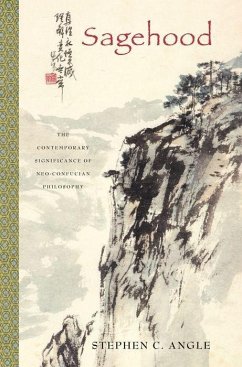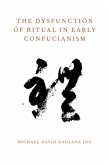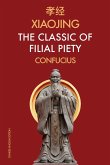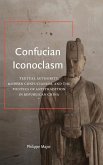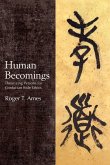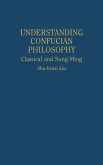- Broschiertes Buch
- Merkliste
- Auf die Merkliste
- Bewerten Bewerten
- Teilen
- Produkt teilen
- Produkterinnerung
- Produkterinnerung
Stephen Angle here provides both an exposition of Neo-Confucian philosophy and a sustained dialogue with many leading Western thinkers¿and especially with those philosophers leading the current renewal of interest in virtue ethics.
Andere Kunden interessierten sich auch für
![Sagehood Sagehood]() Stephen C AngleSagehood88,99 €
Stephen C AngleSagehood88,99 €![The Dysfunction of Ritual in Early Confucianism The Dysfunction of Ritual in Early Confucianism]() Michael David Kaulana IngThe Dysfunction of Ritual in Early Confucianism51,99 €
Michael David Kaulana IngThe Dysfunction of Ritual in Early Confucianism51,99 €![J.D. Ponce on Confucius J.D. Ponce on Confucius]() J. D. PonceJ.D. Ponce on Confucius21,99 €
J. D. PonceJ.D. Ponce on Confucius21,99 €![Xiaojing The Classic of Filial Piety Xiaojing The Classic of Filial Piety]() ConfuciusXiaojing The Classic of Filial Piety11,99 €
ConfuciusXiaojing The Classic of Filial Piety11,99 €![Confucian Iconoclasm Confucian Iconoclasm]() Philippe MajorConfucian Iconoclasm108,99 €
Philippe MajorConfucian Iconoclasm108,99 €![Human Becomings Human Becomings]() Roger T AmesHuman Becomings46,99 €
Roger T AmesHuman Becomings46,99 €![Understanding Confucian Philosophy Understanding Confucian Philosophy]() Shu-Hsien LiuUnderstanding Confucian Philosophy104,99 €
Shu-Hsien LiuUnderstanding Confucian Philosophy104,99 €-
-
-
Stephen Angle here provides both an exposition of Neo-Confucian philosophy and a sustained dialogue with many leading Western thinkers¿and especially with those philosophers leading the current renewal of interest in virtue ethics.
Hinweis: Dieser Artikel kann nur an eine deutsche Lieferadresse ausgeliefert werden.
Hinweis: Dieser Artikel kann nur an eine deutsche Lieferadresse ausgeliefert werden.
Produktdetails
- Produktdetails
- Verlag: Oxford University Press
- Seitenzahl: 312
- Erscheinungstermin: 1. April 2012
- Englisch
- Abmessung: 234mm x 156mm x 17mm
- Gewicht: 477g
- ISBN-13: 9780199922239
- ISBN-10: 0199922233
- Artikelnr.: 34740404
- Herstellerkennzeichnung
- Libri GmbH
- Europaallee 1
- 36244 Bad Hersfeld
- gpsr@libri.de
- Verlag: Oxford University Press
- Seitenzahl: 312
- Erscheinungstermin: 1. April 2012
- Englisch
- Abmessung: 234mm x 156mm x 17mm
- Gewicht: 477g
- ISBN-13: 9780199922239
- ISBN-10: 0199922233
- Artikelnr.: 34740404
- Herstellerkennzeichnung
- Libri GmbH
- Europaallee 1
- 36244 Bad Hersfeld
- gpsr@libri.de
Stephen C. Angle Professor of Philosophy and Eastern Studies, Wesleyan University
Dedication
Preface
Chronology and Dramatis Personae
PART I: KEYWORDS
1 - Sheng/Sage
1.1 "Sage" in the Confucian Tradition
1.1.1 Historical Survey
1.1.2 Neo-Confucianism
1.1.3 Shengren versus Junzi
1.2 Western Ideals
1.2.1 Greece
1.2.2 Contemporary Saints and Heroes
1.3 Concerns About Sagehood
1.3.1 Is Sagehood Realistic?
1.3.2 Is Sagehood Desirable?
2 - Li/Coherence
2.1 First Steps
2.2 Subjective and Objective
2.2.1 Nature and Subjectivity
2.2.2 Settled Coherence and Objectivity
2.3 Li and Qi
2.4 One and Many
2.5 Normativity and Creativity
3 - De/Virtue
3.1 Virtue as a Bridge Concept
3.2 Early "De"
3.3 Neo-Confucian "De"
3.4 Final Thoughts
4 - He/Harmony
4.1 Early Classical Sources
4.1.1 Complementary Differences
4.1.2 Natural Patterns and Creativity
4.2 The Zhongyong ("Doctrine of the Mean")
4.3 Song Neo-Confucianism
4.4 Wang Yangming: Summary and Initial Engagement
4.4.1 Harmony, Coherence and One Body
4.4.2 A Contemporary Example
4.4.3 Politics
PART II: ETHICS AND PSYCHOLOGY
5 - The Scope of Ethics: Dialogue with Slote and Murdoch
5.1 Balance and Harmony in Slote's Agent-Based Ethics
5.1.1 Caring, Humaneness (Ren), and Empathy
5.1.2 Two Kinds of Balance
5.1.3 The Motivation for Overall Balance
5.1.4 Agent-Basing
5.1.5 Reverence
5.2 Murdoch on the Importance of a Transcendent Good
5.2.1 Unity, Mystery, and Faith
5.2.2 Selflessness
5.3 Conclusion: The Scope of Ethics
6 - Challenging Harmony: Consistency, Conflicts, and the Status Quo
6.1 Nussbaum and Stohr Against "Harmony"
6.2 Imagination
6.3 Maximization
6.4 Residue
6.4.1 Complicating the Picture
6.4.2 Grief versus Regret
6.5 Dimensions of Dilemmas
6.6 Emotional Vanilla?
6.6.1 Myers's Challenge
6.6.2 Neo-Confucians on Anger
6.6.3 Conclusions
7 - Sagely Ease and Ethical Perception
7.1 Wang Yangming on Analects 2:4; the Centrality of "Commitment"
7.1.1 Commitment in Classical Texts
7.1.2 Commitment in Wang Yangming
7.1.3 Deepening Our Commitment
7.2 Connecting "Commitment" to "Unity of Knowledge and Action"
7.3 Cua on commitment to realizing a harmonious world
7.3.1 Active Moral Perception
7.3.2 Creativity Revisited
7.4 A Fuller Picture
7.4.1 Murdoch on M and D
7.4.2 Intrusions of the Self
7.4.3 "True Vision Occasions Right Conduct"
PART III: EDUCATION AND POLITICS
8 - Learning to Look for Harmony
8.1 Stages of Ethical Education
8.1.1 Lesser Learning
8.1.2 Establishing a Commitment
8.1.3 Matur(ing) Commitment
8.2. Practices of self-improvement
8.2.1 Spiritual Exercises
8.2.2 Ritual
8.2.3 Reading
8.2.4 Attention - First Steps
8.2.5 Reverence
8.2.6 Further Implications
8.2.7 Reverence and Coherence
8.2.8 Self-Restraint and Quiet Sitting
8.2.9 Conclusion
9 - Engaging Practices
9.1 The Nature of Commitments
9.2 Stages and the Accessibility of Sagely Ideals
9.3 Attention Revisited
9.4 Imagination and Fantasy
9.5 Dialogue
9.6 Faith and Belief
10 - The Political Problem
10.1 Introduction: The Trouble with Sagehood
10.2 Sage and Politics in Song-Qing Neo-Confucianism
10.2.1 Sage-King ideal
10.2.2 Limits and Guidance
10.2.3 Ritual
10.2.4 Institutions
10.2.5 Vaulting Ambition: Rulers Who Think They are Sages
10.3 Confucian Soft Authoritarianism
10.4 Separating the Moral from the Political?
10.4.1 Yu Yingshi and Xu Fuguan
10.4.2 Mou Zongsan
11 - Sages and Politics: A Way Forward
11.1 Perfection and Fallibility
11.2 Reverence and Ritual
11.3 Perfectionism and Institutions
11.3.1 Moderate Perfectionism
11.3.2 Confucian State Perfectionism
11.3.3 Specificity and Particularism
11.4 Participation
11.4.1 Three Arguments
11.4.2 Implications and Objections
11.5 Laws and Rights as a System of Second Resort
11.5.1 Rule by Law
11.5.2 Law and Morality
11.5.3 A Confucian Approach
Conclusion: The Future of Contemporary Confucianisms
Bibliography
Index Locorum
General Index
Preface
Chronology and Dramatis Personae
PART I: KEYWORDS
1 - Sheng/Sage
1.1 "Sage" in the Confucian Tradition
1.1.1 Historical Survey
1.1.2 Neo-Confucianism
1.1.3 Shengren versus Junzi
1.2 Western Ideals
1.2.1 Greece
1.2.2 Contemporary Saints and Heroes
1.3 Concerns About Sagehood
1.3.1 Is Sagehood Realistic?
1.3.2 Is Sagehood Desirable?
2 - Li/Coherence
2.1 First Steps
2.2 Subjective and Objective
2.2.1 Nature and Subjectivity
2.2.2 Settled Coherence and Objectivity
2.3 Li and Qi
2.4 One and Many
2.5 Normativity and Creativity
3 - De/Virtue
3.1 Virtue as a Bridge Concept
3.2 Early "De"
3.3 Neo-Confucian "De"
3.4 Final Thoughts
4 - He/Harmony
4.1 Early Classical Sources
4.1.1 Complementary Differences
4.1.2 Natural Patterns and Creativity
4.2 The Zhongyong ("Doctrine of the Mean")
4.3 Song Neo-Confucianism
4.4 Wang Yangming: Summary and Initial Engagement
4.4.1 Harmony, Coherence and One Body
4.4.2 A Contemporary Example
4.4.3 Politics
PART II: ETHICS AND PSYCHOLOGY
5 - The Scope of Ethics: Dialogue with Slote and Murdoch
5.1 Balance and Harmony in Slote's Agent-Based Ethics
5.1.1 Caring, Humaneness (Ren), and Empathy
5.1.2 Two Kinds of Balance
5.1.3 The Motivation for Overall Balance
5.1.4 Agent-Basing
5.1.5 Reverence
5.2 Murdoch on the Importance of a Transcendent Good
5.2.1 Unity, Mystery, and Faith
5.2.2 Selflessness
5.3 Conclusion: The Scope of Ethics
6 - Challenging Harmony: Consistency, Conflicts, and the Status Quo
6.1 Nussbaum and Stohr Against "Harmony"
6.2 Imagination
6.3 Maximization
6.4 Residue
6.4.1 Complicating the Picture
6.4.2 Grief versus Regret
6.5 Dimensions of Dilemmas
6.6 Emotional Vanilla?
6.6.1 Myers's Challenge
6.6.2 Neo-Confucians on Anger
6.6.3 Conclusions
7 - Sagely Ease and Ethical Perception
7.1 Wang Yangming on Analects 2:4; the Centrality of "Commitment"
7.1.1 Commitment in Classical Texts
7.1.2 Commitment in Wang Yangming
7.1.3 Deepening Our Commitment
7.2 Connecting "Commitment" to "Unity of Knowledge and Action"
7.3 Cua on commitment to realizing a harmonious world
7.3.1 Active Moral Perception
7.3.2 Creativity Revisited
7.4 A Fuller Picture
7.4.1 Murdoch on M and D
7.4.2 Intrusions of the Self
7.4.3 "True Vision Occasions Right Conduct"
PART III: EDUCATION AND POLITICS
8 - Learning to Look for Harmony
8.1 Stages of Ethical Education
8.1.1 Lesser Learning
8.1.2 Establishing a Commitment
8.1.3 Matur(ing) Commitment
8.2. Practices of self-improvement
8.2.1 Spiritual Exercises
8.2.2 Ritual
8.2.3 Reading
8.2.4 Attention - First Steps
8.2.5 Reverence
8.2.6 Further Implications
8.2.7 Reverence and Coherence
8.2.8 Self-Restraint and Quiet Sitting
8.2.9 Conclusion
9 - Engaging Practices
9.1 The Nature of Commitments
9.2 Stages and the Accessibility of Sagely Ideals
9.3 Attention Revisited
9.4 Imagination and Fantasy
9.5 Dialogue
9.6 Faith and Belief
10 - The Political Problem
10.1 Introduction: The Trouble with Sagehood
10.2 Sage and Politics in Song-Qing Neo-Confucianism
10.2.1 Sage-King ideal
10.2.2 Limits and Guidance
10.2.3 Ritual
10.2.4 Institutions
10.2.5 Vaulting Ambition: Rulers Who Think They are Sages
10.3 Confucian Soft Authoritarianism
10.4 Separating the Moral from the Political?
10.4.1 Yu Yingshi and Xu Fuguan
10.4.2 Mou Zongsan
11 - Sages and Politics: A Way Forward
11.1 Perfection and Fallibility
11.2 Reverence and Ritual
11.3 Perfectionism and Institutions
11.3.1 Moderate Perfectionism
11.3.2 Confucian State Perfectionism
11.3.3 Specificity and Particularism
11.4 Participation
11.4.1 Three Arguments
11.4.2 Implications and Objections
11.5 Laws and Rights as a System of Second Resort
11.5.1 Rule by Law
11.5.2 Law and Morality
11.5.3 A Confucian Approach
Conclusion: The Future of Contemporary Confucianisms
Bibliography
Index Locorum
General Index
Dedication
Preface
Chronology and Dramatis Personae
PART I: KEYWORDS
1 - Sheng/Sage
1.1 "Sage" in the Confucian Tradition
1.1.1 Historical Survey
1.1.2 Neo-Confucianism
1.1.3 Shengren versus Junzi
1.2 Western Ideals
1.2.1 Greece
1.2.2 Contemporary Saints and Heroes
1.3 Concerns About Sagehood
1.3.1 Is Sagehood Realistic?
1.3.2 Is Sagehood Desirable?
2 - Li/Coherence
2.1 First Steps
2.2 Subjective and Objective
2.2.1 Nature and Subjectivity
2.2.2 Settled Coherence and Objectivity
2.3 Li and Qi
2.4 One and Many
2.5 Normativity and Creativity
3 - De/Virtue
3.1 Virtue as a Bridge Concept
3.2 Early "De"
3.3 Neo-Confucian "De"
3.4 Final Thoughts
4 - He/Harmony
4.1 Early Classical Sources
4.1.1 Complementary Differences
4.1.2 Natural Patterns and Creativity
4.2 The Zhongyong ("Doctrine of the Mean")
4.3 Song Neo-Confucianism
4.4 Wang Yangming: Summary and Initial Engagement
4.4.1 Harmony, Coherence and One Body
4.4.2 A Contemporary Example
4.4.3 Politics
PART II: ETHICS AND PSYCHOLOGY
5 - The Scope of Ethics: Dialogue with Slote and Murdoch
5.1 Balance and Harmony in Slote's Agent-Based Ethics
5.1.1 Caring, Humaneness (Ren), and Empathy
5.1.2 Two Kinds of Balance
5.1.3 The Motivation for Overall Balance
5.1.4 Agent-Basing
5.1.5 Reverence
5.2 Murdoch on the Importance of a Transcendent Good
5.2.1 Unity, Mystery, and Faith
5.2.2 Selflessness
5.3 Conclusion: The Scope of Ethics
6 - Challenging Harmony: Consistency, Conflicts, and the Status Quo
6.1 Nussbaum and Stohr Against "Harmony"
6.2 Imagination
6.3 Maximization
6.4 Residue
6.4.1 Complicating the Picture
6.4.2 Grief versus Regret
6.5 Dimensions of Dilemmas
6.6 Emotional Vanilla?
6.6.1 Myers's Challenge
6.6.2 Neo-Confucians on Anger
6.6.3 Conclusions
7 - Sagely Ease and Ethical Perception
7.1 Wang Yangming on Analects 2:4; the Centrality of "Commitment"
7.1.1 Commitment in Classical Texts
7.1.2 Commitment in Wang Yangming
7.1.3 Deepening Our Commitment
7.2 Connecting "Commitment" to "Unity of Knowledge and Action"
7.3 Cua on commitment to realizing a harmonious world
7.3.1 Active Moral Perception
7.3.2 Creativity Revisited
7.4 A Fuller Picture
7.4.1 Murdoch on M and D
7.4.2 Intrusions of the Self
7.4.3 "True Vision Occasions Right Conduct"
PART III: EDUCATION AND POLITICS
8 - Learning to Look for Harmony
8.1 Stages of Ethical Education
8.1.1 Lesser Learning
8.1.2 Establishing a Commitment
8.1.3 Matur(ing) Commitment
8.2. Practices of self-improvement
8.2.1 Spiritual Exercises
8.2.2 Ritual
8.2.3 Reading
8.2.4 Attention - First Steps
8.2.5 Reverence
8.2.6 Further Implications
8.2.7 Reverence and Coherence
8.2.8 Self-Restraint and Quiet Sitting
8.2.9 Conclusion
9 - Engaging Practices
9.1 The Nature of Commitments
9.2 Stages and the Accessibility of Sagely Ideals
9.3 Attention Revisited
9.4 Imagination and Fantasy
9.5 Dialogue
9.6 Faith and Belief
10 - The Political Problem
10.1 Introduction: The Trouble with Sagehood
10.2 Sage and Politics in Song-Qing Neo-Confucianism
10.2.1 Sage-King ideal
10.2.2 Limits and Guidance
10.2.3 Ritual
10.2.4 Institutions
10.2.5 Vaulting Ambition: Rulers Who Think They are Sages
10.3 Confucian Soft Authoritarianism
10.4 Separating the Moral from the Political?
10.4.1 Yu Yingshi and Xu Fuguan
10.4.2 Mou Zongsan
11 - Sages and Politics: A Way Forward
11.1 Perfection and Fallibility
11.2 Reverence and Ritual
11.3 Perfectionism and Institutions
11.3.1 Moderate Perfectionism
11.3.2 Confucian State Perfectionism
11.3.3 Specificity and Particularism
11.4 Participation
11.4.1 Three Arguments
11.4.2 Implications and Objections
11.5 Laws and Rights as a System of Second Resort
11.5.1 Rule by Law
11.5.2 Law and Morality
11.5.3 A Confucian Approach
Conclusion: The Future of Contemporary Confucianisms
Bibliography
Index Locorum
General Index
Preface
Chronology and Dramatis Personae
PART I: KEYWORDS
1 - Sheng/Sage
1.1 "Sage" in the Confucian Tradition
1.1.1 Historical Survey
1.1.2 Neo-Confucianism
1.1.3 Shengren versus Junzi
1.2 Western Ideals
1.2.1 Greece
1.2.2 Contemporary Saints and Heroes
1.3 Concerns About Sagehood
1.3.1 Is Sagehood Realistic?
1.3.2 Is Sagehood Desirable?
2 - Li/Coherence
2.1 First Steps
2.2 Subjective and Objective
2.2.1 Nature and Subjectivity
2.2.2 Settled Coherence and Objectivity
2.3 Li and Qi
2.4 One and Many
2.5 Normativity and Creativity
3 - De/Virtue
3.1 Virtue as a Bridge Concept
3.2 Early "De"
3.3 Neo-Confucian "De"
3.4 Final Thoughts
4 - He/Harmony
4.1 Early Classical Sources
4.1.1 Complementary Differences
4.1.2 Natural Patterns and Creativity
4.2 The Zhongyong ("Doctrine of the Mean")
4.3 Song Neo-Confucianism
4.4 Wang Yangming: Summary and Initial Engagement
4.4.1 Harmony, Coherence and One Body
4.4.2 A Contemporary Example
4.4.3 Politics
PART II: ETHICS AND PSYCHOLOGY
5 - The Scope of Ethics: Dialogue with Slote and Murdoch
5.1 Balance and Harmony in Slote's Agent-Based Ethics
5.1.1 Caring, Humaneness (Ren), and Empathy
5.1.2 Two Kinds of Balance
5.1.3 The Motivation for Overall Balance
5.1.4 Agent-Basing
5.1.5 Reverence
5.2 Murdoch on the Importance of a Transcendent Good
5.2.1 Unity, Mystery, and Faith
5.2.2 Selflessness
5.3 Conclusion: The Scope of Ethics
6 - Challenging Harmony: Consistency, Conflicts, and the Status Quo
6.1 Nussbaum and Stohr Against "Harmony"
6.2 Imagination
6.3 Maximization
6.4 Residue
6.4.1 Complicating the Picture
6.4.2 Grief versus Regret
6.5 Dimensions of Dilemmas
6.6 Emotional Vanilla?
6.6.1 Myers's Challenge
6.6.2 Neo-Confucians on Anger
6.6.3 Conclusions
7 - Sagely Ease and Ethical Perception
7.1 Wang Yangming on Analects 2:4; the Centrality of "Commitment"
7.1.1 Commitment in Classical Texts
7.1.2 Commitment in Wang Yangming
7.1.3 Deepening Our Commitment
7.2 Connecting "Commitment" to "Unity of Knowledge and Action"
7.3 Cua on commitment to realizing a harmonious world
7.3.1 Active Moral Perception
7.3.2 Creativity Revisited
7.4 A Fuller Picture
7.4.1 Murdoch on M and D
7.4.2 Intrusions of the Self
7.4.3 "True Vision Occasions Right Conduct"
PART III: EDUCATION AND POLITICS
8 - Learning to Look for Harmony
8.1 Stages of Ethical Education
8.1.1 Lesser Learning
8.1.2 Establishing a Commitment
8.1.3 Matur(ing) Commitment
8.2. Practices of self-improvement
8.2.1 Spiritual Exercises
8.2.2 Ritual
8.2.3 Reading
8.2.4 Attention - First Steps
8.2.5 Reverence
8.2.6 Further Implications
8.2.7 Reverence and Coherence
8.2.8 Self-Restraint and Quiet Sitting
8.2.9 Conclusion
9 - Engaging Practices
9.1 The Nature of Commitments
9.2 Stages and the Accessibility of Sagely Ideals
9.3 Attention Revisited
9.4 Imagination and Fantasy
9.5 Dialogue
9.6 Faith and Belief
10 - The Political Problem
10.1 Introduction: The Trouble with Sagehood
10.2 Sage and Politics in Song-Qing Neo-Confucianism
10.2.1 Sage-King ideal
10.2.2 Limits and Guidance
10.2.3 Ritual
10.2.4 Institutions
10.2.5 Vaulting Ambition: Rulers Who Think They are Sages
10.3 Confucian Soft Authoritarianism
10.4 Separating the Moral from the Political?
10.4.1 Yu Yingshi and Xu Fuguan
10.4.2 Mou Zongsan
11 - Sages and Politics: A Way Forward
11.1 Perfection and Fallibility
11.2 Reverence and Ritual
11.3 Perfectionism and Institutions
11.3.1 Moderate Perfectionism
11.3.2 Confucian State Perfectionism
11.3.3 Specificity and Particularism
11.4 Participation
11.4.1 Three Arguments
11.4.2 Implications and Objections
11.5 Laws and Rights as a System of Second Resort
11.5.1 Rule by Law
11.5.2 Law and Morality
11.5.3 A Confucian Approach
Conclusion: The Future of Contemporary Confucianisms
Bibliography
Index Locorum
General Index

